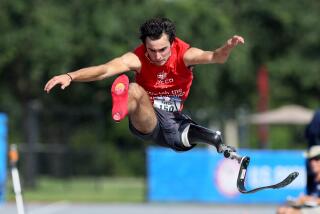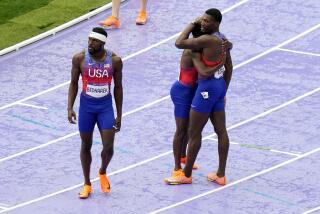U.S. Track and Field Trials Notebook : With Bit of Help From Lewis, DeLoach Continues to Pay His Own Way
- Share via
INDIANAPOLIS — As a freshman at the University of Houston, Joe DeLoach was declared ineligible for National Collegiate Athletic Assn. competition because he was recruited illegally.
According to the NCAA, DeLoach was recruited by a party who was not a declared representative of the university. The party? Carl Lewis.
That year, DeLoach had to pay his own tuition, which he earned by working in a T-shirt store.
But Lewis since has made it up to DeLoach, giving him advice during workouts in Houston.
Wednesday night, DeLoach beat Lewis in the 200 meters at the U.S. Olympic track and field trials.
Even before the competition, DeLoach said, “It’s like everything Carl touches turns to gold.”
Lewis said he didn’t mind finishing second, as long as it was to DeLoach.
“If you’re going to lose, you’re glad it’s to somebody who has great talent,” said Lewis, who made the Olympic team in his third event after qualifying earlier in the 100 meters and the long jump. “It’s gone on deaf ears, but I’ve spoken about Joe all year. He’s as good as anybody right now.”
Lewis did not give a definitive answer when asked if he will enter four events in Seoul, as he did four years ago in Los Angeles.
His concern is the 200 meters, in which he would have to run two qualifying races on the same day as the long jump final.
The schedule already has been changed once, but it still gives him only 55 minutes between the second 200 race and the long jump. He has asked for another change.
“I believe they’ll change the schedule, and we’ll go from there,” he said Wednesday night.
Primo Nebiolo, president of the International Amateur Athletic Federation, indicated last week that another change is possible.
“We have to accommodate our heroes in the sport,” he said.
Hard-luck Henry Marsh was running easily in the 3,000 meters steeplechase semifinal Wednesday night, appearing as if he would easily qualify for Friday night’s final.
But with 200 meters remaining, he was clipped from behind by another runner and stumbled over the final barrier. He got up and sprinted to the finish, barely finishing in sixth place.
“At that point, with 200 meters to go, everybody is in a full sprint,” Marsh said. “You don’t want to be flat on your face.
“I was scared. I had to expend a lot more energy than I wanted to for a semifinal.”
In 1981, Marsh finished first in the World Cup, but he was disqualified when another runner cut in and forced him to run around the last water jump, which is a violation.
In 1983, he was making a strong move down the stretch in the World Championships and appeared as if he might win until he fell while trying to clear the last barrier.
In 1984, he caught a virus a few days before the Olympic Games and was nosed out at the finish line by another American, Brian Diemer.
This year, a few days before he came here, he caught another virus.
As if that weren’t bad enough, he was driving to the Indiana-Purdue University Stadium for the first round Monday night when his car was rammed from behind by a car driven by one of the officials.
Gary Kinder led after the first five events in the decathlon, but he was not in a particularly good mood when he was asked about the United States’ decline in the event after producing Olympic champions such as Rafer Johnson, Bill Toomey and Bruce Jenner.
“Bruce Jenner isn’t helping us at all,” he said. “I’m not talking about money. He won’t make speeches. He won’t appear at clinics. I think he owes it to the sport. But he won’t even give his time to speak to decathletes at the Olympic Sports Center. I’d like to be the one to break his record.”
Kinder also had choice words for hurdler Roger Kingdom, who has said that he could make the Olympic team in the decathlon if he could clear 13 feet in the pole vault.
“That’s the kind of thing that makes me mad,” Kinder said. “If he can do it, cool. Train for it and come out and beat us. But don’t talk about it before you do it.
“It’s easy on paper. But (hurdler) Andre Phillips, who’s a much better athlete than Roger Kingdom, tried it and could only get through six events.”
Leslie Maxie, who took this year off from USC to concentrate on training for the trials, made the U.S. team by finishing second in the 400-meter intermediate hurdles.
Maxie, who reached the final of the trials four years ago as a 17-year-old high school junior from Millbrae, Calif., said she was confident she would make the team this year.
“I didn’t see myself as a real contender before the Olympic trials last time,” she said. “This time, I had paid my dues. My coach said that if I could come into the trials healthy, I’d make it.”
She said she will return to USC next fall as a junior majoring in public administration and political science.
“In order for me to peak for the trials, I had to get away from school and choose the races I wanted to run,” she said. “Fred (LaPlante, USC Coach) would have been understanding, but it’s a business for him. So I had to look at it as a business and do what’s best for me.”
Failing to make the Olympic team in the 400-meter intermediate hurdles was Judi Brown-King, who won a silver medal in 1984. She finished fifth in the final.
Doctors had to give her a saline solution intravenously Sunday after she became dehydrated during the first round.
“I almost dehydrated myself again crying,” she said after the final. “I feel like I’m at my own funeral.”
Valerie Brisco, who won three gold medals in the 1984 Olympics, barely made the U.S. team this time, finishing third Monday night in the 400 meters.
She predicts she will be in better shape in Seoul, explaining that she had a slow start this year after breaking two ribs.
How did that happen?
“I was playing around with my boyfriend, and he tackled me,” she said.
Her boyfriend is Frank Liles, who almost made the Olympic team this year as a boxer in the 156-pound weight class.
Joetta Clark, who made the team by finishing third Monday night in the 800 meters, is the daughter of Joe Clark, the controversial principal of Eastside High School in Paterson, N.J.
Clark, who keeps discipline in the high school by patrolling the halls with a baseball bat, was on the cover of Time magazine earlier this year. There also is a movie about him in the works.
More to Read
Go beyond the scoreboard
Get the latest on L.A.'s teams in the daily Sports Report newsletter.
You may occasionally receive promotional content from the Los Angeles Times.






